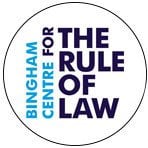
‘The clearest way to show what the
rule of law means to us in everyday
life is to recall what has happened
when there is no rule of law.’
So said Dwight D. Eisenhower. But for global businesses, often headquartered in countries that have long enjoyed the benefits of a robust judiciary, the connection between rule of law and profitability might not always be so obvious.
Yet rule of law issues could be underpinning much of a company’s risk register, amounting to potential for significant exposure. Sanctity of contracts, supply chain integrity, cybersecurity, privacy, expropriation of assets, bribery and corruption, and regulatory unpredictability all impact on the bottom line for businesses operating in jurisdictions where rule of law cannot be guaranteed.
Diageo general counsel Siobhan Moriarty gave a real-life example when she spoke at the launch of the Bingham Centre Business Network in January 2017. The global drinks multinational owns a 100-year-old Scotch whisky brand called ‘VAT 69’, but a trade mark ‘troll’ had registered the mark ‘VAT 99’ in India. What should have been a straightforward case of passing off, lack of use, and getting the mark removed from the register, took 19 years; eventually ending with judgment in Diageo’s favour.
For businesses that don’t have a spare generation to hang about solving simple disputes, raising concerns about seemingly disparate issues across far-flung geographical locations can feel like a lonely job. And it’s a task that is often undertaken by the general counsel, in-keeping with the temptation of many businesses to see such rule of law matters as ‘one for the lawyers’.
This is something that Graham Vinter takes issue with. The former general counsel of oil and gas company BG Group, now chairs the Bingham Centre’s Business Network (as well as heading a law firm’s international project finance group). In his view, ‘This is something that could really damage your business, and you as a whole board need to understand what the rule of law risks are and how to deal with them’.
Founded in 2010, the UK-based Bingham Centre for the Rule of Law is part of the British Institute of International and Comparative Law (BIICL) and works to promote and enhance the rule of law globally. Its past field projects have included travelling to developing markets and training members of the local judiciary, the Bar and even business people about the rule of law.
Its latest initiative is the Business Network, launched in early 2017 to act as a bridge between the Centre and the international corporate community. Nine founding members have signed up: BP, BT, Diageo, HSBC, Nestlé, Rolls-Royce, Shell, Unilever and Vodafone.
The overarching appeal of the Network for these first corporate members is the power of collaborative action. Says BT’s head of legal, privacy, security and internet, Greg Hughes: ‘The voice [the Network has] is so much stronger than a corporate voice alone.’ His colleague Moira Oliver, who heads policy and is chief counsel for human rights at BT, adds that: ‘There’s benefit in not duplicating effort and in understanding good practice from each other’.
It’s early days, but the Network’s nine founding members are busy generating ideas for projects that the Centre will carry out. The first two projects will focus on resolving conflict between local laws and the UN Guiding Principles for Business and Human Rights, as well as rule of law training for boards, senior managers and in-house lawyers involved in risk management. ‘This is not meant to be just a purely intellectual exercise,’ says Vinter, ‘and that’s exactly why the Network is there.’
Says Michael Coates, associate general counsel and UK head of legal at Shell, ‘General counsel need to help their boards to understand the importance of these risks and the need for long-term investment and collaboration with others to mitigate them.’ He gives a stark illustration, which he believes all business leaders should take note of: ‘… in Shell’s Annual Report 2015, we noted that Shell operates in more than 70 countries that have differing degrees of political, legal and fiscal stability. This exposes us to a wide range of political developments that could result in changes to contractual terms, laws and regulations.’
Other projects under consideration touch on issues such as the future of business relationships, obligations and legal arrangements post-Brexit, training for bureaucrats in public decision-making to avoid lengthy legal proceedings, investigatory and regulatory powers, freedom of expression and content filtering.
The rule of law in Myanmar
The Bingham Centre has been engaged in a range of work relating to constitutional reform in Myanmar since early 2013. This work aimed to present different options to Myanmar’s MPs to enable them to choose the most appropriate manner of implementation for their particular national context.
In September 2013, at the request of the Myanmar Parliamentary Committee on the Rule of Law, the Centre wrote a 28-page Manual on Constitution Options, outlining possible areas for reform.
In October of the same year, Centre staff provided training for around 90 lawyers in the country and met with relevant parliamentary committees. Two Centre staff then toured ten cities in ten days with the Myanmar Lawyers Association, running workshops with local groups.
The visits facilitated the writing, by local groups, of 200 submissions on the reform of the constitution. With local lawyers then continuing the training, a further 300 submissions were made to the parliamentary committee as part of the reform process.
In January 2015, the Centre held a symposium in Myanmar, which was attended by about 50 MPs from a range of parties. Meetings were also held with Aung San Suu Kyi, leader of the National League for Democracy (NLD).
In November 2015, the NLD won a landslide victory in Myanmar following the country’s first openly contested national vote since a nominally civilian government was introduced in 2011, ending nearly 50 years of military rule.
The new parliament convened for the first time in February 2016, with Htin Kyaw elected as the country’s president – the first non-military president since the military coup of 1962. Aung San Suu Kyi became Myanmar’s inaugural State Counsellor in April 2016 despite military opposition, a powerful new role created to maintain her influence within the new government.
The corporate members agree that the Network’s remit must encompass a plurality of issues, and that its role is as an advisory group to the Bingham Centre, which remains an independent body. The point is not to become a lobbying body for corporate interests, but to inform the Centre’s actions in a multiplicity of areas that impact on corporate life globally. To this end, the Network is open to new members of all sizes (including small and medium-sized enterprises), based in all geographies.
As chair Graham Vinter makes clear, ‘You won’t be surprised to learn that the overwhelming requirement for any company to become a member is that it’s committed to the rule of law. New members are invited by agreement between the Centre and the members of the Network and as long as you are committed to the rule of law – and obviously we’ll do some due diligence – then it is pretty much open to any corporate.’
Each member pays a subscription, but there is no obligation to provide funding for any particular project once it is confirmed. In addition, Vinter is looking at implementing a tiered subscription model based on organisation size. But the benefits of joining could outweigh the costs for smaller organisations, and BT’s Moira Oliver points out the best practice advantages of avoiding having to plough your own furrow: ‘If [smaller companies] don’t have the internal resources to deal with these sorts of issues then joining the Network could help them in that broader scope.’
Shell’s Michael Coates sums up his case for why GCs should pay attention to the Bingham Centre’s Business Network as it begins its work in shaping a joint corporate response to rule of law risks: ‘We are more likely to have a positive impact on the rule of law in the markets in which we operate by working with the Bingham Centre and with other companies. This will help us to protect our investments and our people, and to contribute to economic development.’
Perhaps the scale of the risks posed to companies by rule of law issues could also present an interesting opportunity for GCs looking to partner more closely with their own board and senior management teams, and embed in-house teams further into the business.
